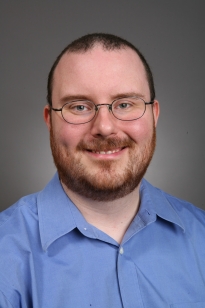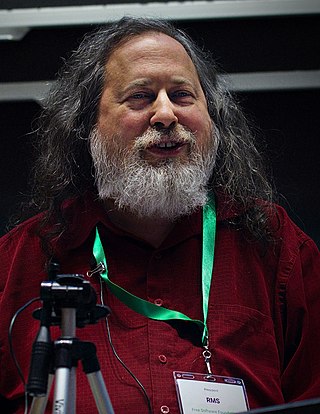The Artistic License is an open-source license used for certain free and open-source software packages, most notably the standard implementation of the Perl programming language and most CPAN modules, which are dual-licensed under the Artistic License and the GNU General Public License (GPL).

Free software, libre software, or libreware is computer software distributed under terms that allow users to run the software for any purpose as well as to study, change, and distribute it and any adapted versions. Free software is a matter of liberty, not price; all users are legally free to do what they want with their copies of a free software regardless of how much is paid to obtain the program. Computer programs are deemed "free" if they give end-users ultimate control over the software and, subsequently, over their devices.

Eben Moglen is an American legal scholar who is professor of law and legal history at Columbia University, and is the founder, Director-Counsel and Chairman of Software Freedom Law Center.
The Common Development and Distribution License (CDDL) is a free and open-source software license, produced by Sun Microsystems, based on the Mozilla Public License (MPL). Files licensed under the CDDL can be combined with files licensed under other licenses, whether open source or proprietary. In 2005 the Open Source Initiative approved the license. The Free Software Foundation (FSF) considers it a free software license, but one which is incompatible with the GNU General Public License (GPL).

The Software Freedom Law Center (SFLC) is an organization that provides pro bono legal representation and related services to not-for-profit developers of free software/open source software. It was launched in February 2005 with Eben Moglen as chairman. Initial funding of US$4 million was pledged by Open Source Development Labs.

Bradley M. Kuhn is a free software activist from the United States.
Alternative terms for free software, such as open source, FOSS, and FLOSS, have been a controversial issue among free and open-source software users from the late 1990s onwards. These terms share almost identical licence criteria and development practices.

Richard Matthew Stallman, also known by his initials, rms, is an American free software movement activist and programmer. He campaigns for software to be distributed in such a manner that its users have the freedom to use, study, distribute, and modify that software. Software that ensures these freedoms is termed free software. Stallman launched the GNU Project, founded the Free Software Foundation (FSF) in October 1985, developed the GNU Compiler Collection and GNU Emacs, and wrote all versions of the GNU General Public License.
Tivoization is the practice of designing hardware that incorporates software under the terms of a copyleft software license like the GNU General Public License, but uses hardware restrictions or digital rights management (DRM) to prevent users from running modified versions of the software on that hardware. Richard Stallman of the Free Software Foundation (FSF) coined the term in reference to TiVo's use of GNU GPL licensed software on the TiVo brand digital video recorders (DVR), which actively block modified software by design. Stallman believes this practice denies users some of the freedom that the GNU GPL was designed to protect. The FSF refers to tivoized hardware as "proprietary tyrants".
This comparison only covers software licenses which have a linked Wikipedia article for details and which are approved by at least one of the following expert groups: the Free Software Foundation, the Open Source Initiative, the Debian Project and the Fedora Project. For a list of licenses not specifically intended for software, see List of free-content licences.
License proliferation is the phenomenon of an abundance of already existing and the continued creation of new software licenses for software and software packages in the FOSS ecosystem. License proliferation affects the whole FOSS ecosystem negatively by the burden of increasingly complex license selection, license interaction, and license compatibility considerations.
License compatibility is a legal framework that allows for pieces of software with different software licenses to be distributed together. The need for such a framework arises because the different licenses can contain contradictory requirements, rendering it impossible to legally combine source code from separately-licensed software in order to create and publish a new program. Proprietary licenses are generally program-specific and incompatible; authors must negotiate to combine code. Copyleft licenses are commonly deliberately incompatible with proprietary licenses, in order to prevent copyleft software from being re-licensed under a proprietary license, turning it into proprietary software. Many copyleft licenses explicitly allow relicensing under some other copyleft licenses. Permissive licenses are compatible with everything, including proprietary licenses; there is thus no guarantee that all derived works will remain under a permissive license.

The GNU Affero General Public License is a free, copyleft license published by the Free Software Foundation in November 2007, and based on the GNU GPL version 3 and the Affero General Public License (non-GNU).

Richard Fontana is a lawyer in the United States who is particularly known for his work in the area of open source and free software. Fontana works at Red Hat. Before Red Hat he was counsel at the Software Freedom Law Center (SFLC). In 2012 Fontana began drafting copyleft-next, a modification of the GNU General Public License, version 3 (GPLv3). While at SFLC, Fontana was one of the three principal authors, along with Richard Stallman and Eben Moglen, of the GPLv3, the GNU Lesser General Public License, version 3 (LGPLv3), and the GNU Affero General Public License. He is currently a member-elected director of the Open Source Initiative.

A free-software license is a notice that grants the recipient of a piece of software extensive rights to modify and redistribute that software. These actions are usually prohibited by copyright law, but the rights-holder of a piece of software can remove these restrictions by accompanying the software with a software license which grants the recipient these rights. Software using such a license is free software as conferred by the copyright holder. Free-software licenses are applied to software in source code and also binary object-code form, as the copyright law recognizes both forms.

The GNU General Public License is a series of widely used free software licenses, or copyleft, that guarantee end users the four freedoms to run, study, share, and modify the software. The license was the first copyleft for general use, and was originally written by Richard Stallman, the founder of the Free Software Foundation (FSF), for the GNU Project. The license grants the recipients of a computer program the rights of the Free Software Definition. The licenses in the GPL series are all copyleft licenses, which means that any derivative work must be distributed under the same or equivalent license terms. It is more restrictive than the Lesser General Public License, and even further distinct from the more widely-used permissive software licenses BSD, MIT, and Apache.

The GNU Free Documentation License is a copyleft license for free documentation, designed by the Free Software Foundation (FSF) for the GNU Project. It is similar to the GNU General Public License, giving readers the rights to copy, redistribute, and modify a work and requires all copies and derivatives to be available under the same license. Copies may also be sold commercially, but, if produced in larger quantities, the original document or source code must be made available to the work's recipient.
The Free Software Foundation (FSF) is a 501(c)(3) non-profit organization founded by Richard Stallman on October 4, 1985, to support the free software movement, with the organization's preference for software being distributed under copyleft terms, such as with its own GNU General Public License. The FSF was incorporated in Boston, Massachusetts, United States, where it is also based.

Text annotation is the practice and the result of adding a note or gloss to a text, which may include highlights or underlining, comments, footnotes, tags, and links. Text annotations can include notes written for a reader's private purposes, as well as shared annotations written for the purposes of collaborative writing and editing, commentary, or social reading and sharing. In some fields, text annotation is comparable to metadata insofar as it is added post hoc and provides information about a text without fundamentally altering that original text. Text annotations are sometimes referred to as marginalia, though some reserve this term specifically for hand-written notes made in the margins of books or manuscripts. Annotations have been found to be useful and help to develop knowledge of English literature.

co-ment / COMT is a online word processor allowing collaborative writing and commenting. It was inspired by the software package stet, which was created to handle the GNU GPL version 3 online revision. It is free software, available under Affero GPL.











